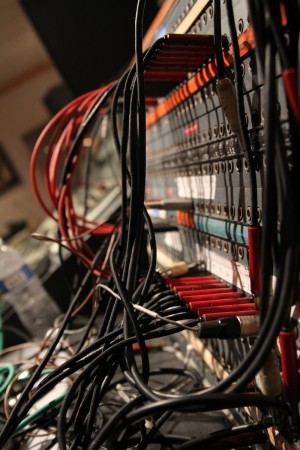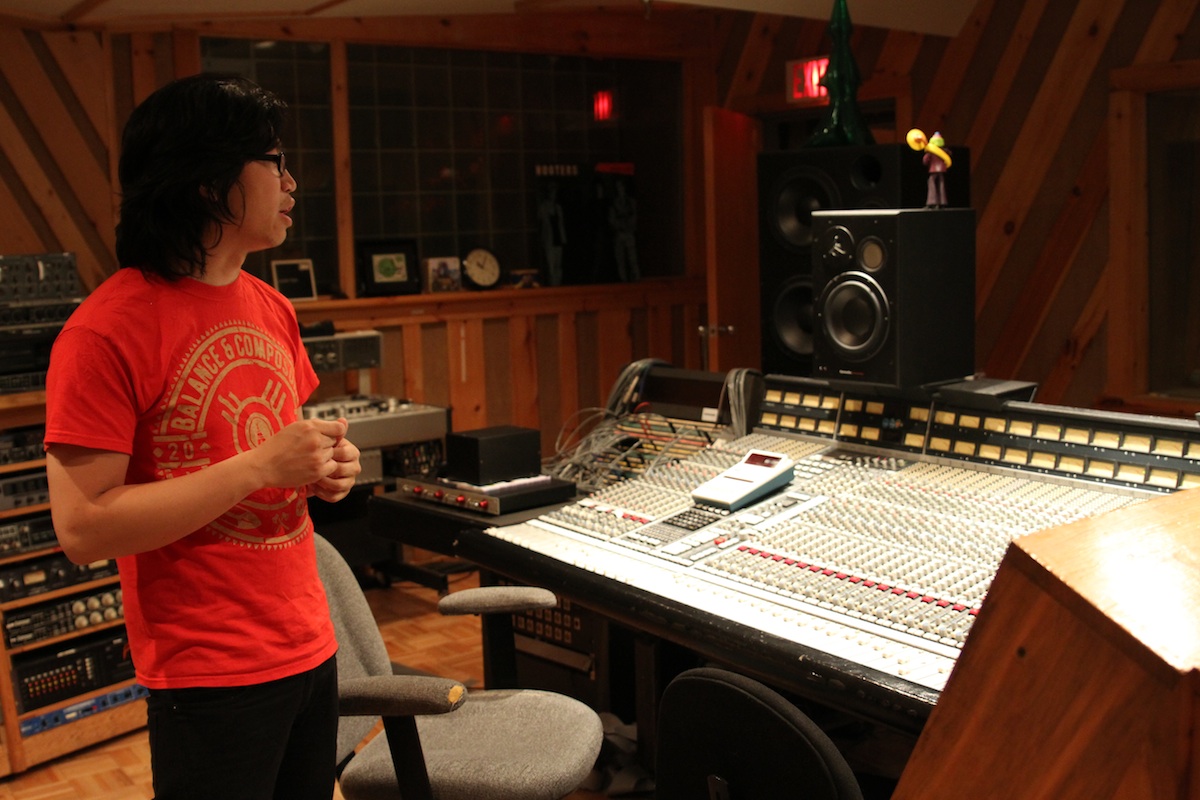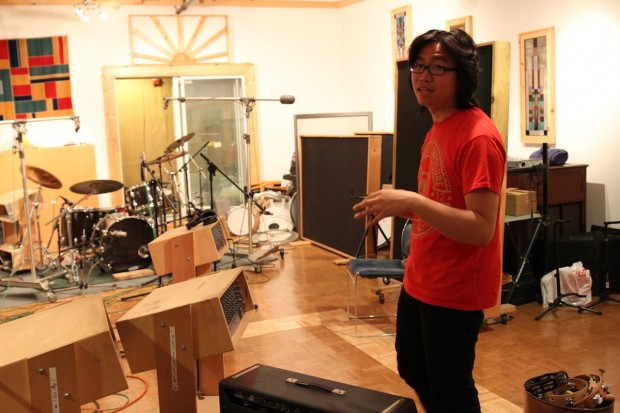
Not a Cookie-Cutter: Conshohocken producer Will Yip crafts a new alternative at Studio 4
Settled between a row of gleaming gold records and a wall of shiny metal knobs, producer Will Yip looks at right at home behind his Neve console in Conshohoken’s Studio 4.
He and Wayne Wildrick, guitarist for Jersey-based pop punk band Man Overboard, listen to drummer Joe Talarico play in the next room. He’s tracking for a fast, new and un-demoed Man O song, and still not quite getting it despite take after take. Yip gives direction on hitting the crash and keeping tempo as the drummer’s bandmate offers more pointers in reference to the other instrumentation in the song. The click track whirs by again and again; the BPMs are so high, it’s more like a hum than a rhythm.
“How is it possible for any human to play along with that?” Yip asks jokingly. But as a drummer who’s played every style from hardcore to R&B, he probably has some idea.

Photo by John Vettese
There’s a wealth of knowledge and experience, coupled with a can-do attitude, that has brought bands to record with Yip in Studio 4 since he was just barely out of his teens. Now, the 26-year-old remains laid back and constantly smiling despite the pressure one might think would come with recording some of the best bands in the current punk/pop punk/hardcore scene, and working to bring out the best in all of them.
“He’s something else, that’s for sure,” Wildrick says of working with Yip. Man Overboard recorded for the first time with him in January for their third studio album Heart Attack, and credits Yip with its success. “He brings the performance out of bands. It’s just a whole other thing.”
From hometown heroes of the greater Philadelphia area – Circa Survive, Title Fight, Balance and Composure and Daylight – to national acts, bands from every area of alternative have been flocking to Yip for his stamp of production approval. In turn, he’s helped these bands reach vocal and instrumental lengths they never dreamed of, given them releases worthy of the Billboard Top 200, and most likely became one of their best friends in just that short month or so spent in the studio.
All of Yip’s efforts, from his work ethic to his approachable demeanor, are a part of his 30-year rule.
“That means 30 years later, when we’re 50, when we’re 60 and looking back, we’re not going to think about that deadline that we missed,” Yip says. “We’re thinking about the record itself, the songs. If we don’t have the best material, then at 30 years it would be hard. … That’s my goal, just to not cut any corners and do it right, because you have to live with it.”
Taking up residency at Studio 4 – a room over from owner and legendary and Grammy-winning producer Phil Nicolo, maker of the gold records on the wall behind him – wasn’t something Yip imagined would happen after his first taste of the recording world at age 14. Yip started out by sweeping floors and answering phone calls for Chris Grillo at Ground Control Recording in Northeast Philly. He bought his first board from him for the same $500 he saved up working there.

Photo by John Vettese
“I didn’t know what the fuck I was doing,” Yip recalls. “I had no clue. I took the board home, plugged it in and hoped it made sound.”
Now he gets to record punk bands on the same type of Neve board that Dave Grohl has. Instead of paying $2000 a day to use a tracking room like the one in Studio 4 – as some bands he’s encountered have done – Yip has budgeted entire records for that price simply because he’ll take on the projects he wants to do, despite financial or any other obstacles.
He knows he’s lucky to be where he is in his life and his career, and continually takes advantage of his fortune. But Yip’s efforts aren’t just for him.
His own 30-year rule is to ensure he can stay in Studio 4 – and ensure that punk always has a studio to call home.
“Punk bands like us,” Yip says. “Like Title Fight and Blacklisted. That’s why I knew I had a thing here, because we’re not supposed to be recording in a studio like this.”
Meaning, a studio designed for pop blockbusters. Yip points to the mix room down the hall, and the big tracking room, and says that those gold records were recorded here – musicians from Billy Joel to The Fugees.
“I’m super lucky to have Phil invite me in here. I don’t know how it happened. I want to, not take advantage of it, but at least make this a special thing. This such a special, cool thing for us. I want to give an experience and this tool, this room, and myself for a budget that, undeniably, no one can fuck with.”
It wasn’t just the equipment that has helped Yip make a name for himself in the recording world. It doesn’t hurt that ensconced between Scranton, Doylestown, Philadelphia and South Jersey are a number of bands at the forefront of the national punk, indie and hardcore scenes.
“I’m super, super happy that this scene is just coming out, and just blowing up,” Yip says. “It deserves it, you know, every band. Tigers Jaw, Title Fight, Balance, Daylight, Man O, Circa, Good Old War. All the bands are within an arm’s reach from here, and they’re all the best at what they do.
The proximity to such talent gave Yip a vision of working in Studio 4, basically, forever. So he made Nicolo an offer to buy the space from him.
“It’s not that I think that his time is done or anything, but it makes sense,” Yip says. “I was like, what could I possibly lose? He’s one of my best friends, we toured together for a while with Lauryn [Hill]. I’ve been working for him now for six years. So I said dude, at least maybe some co-ownership, and then when you leave I’ll buy the rest out. So that’s kind of the deal where I’ll own half the studio, and then I’ll buy the other half when he is done, if he ever gets done.”
To help raise the money to establish this co-ownership, Yip announced on Monday a compilation album featuring new tracks from several of his past-recorded artists. Titled Off The Board: A Studio 4 Family Compilation, it will be coupled with a webstore fundraiser that will include limited-edition merchandise and one-of-a-kind prizes from the bands.
“It’s probably going to be the only comp ever to feature this quality of bands, and everyone is recording new tracks and having [them] done here,” he says. “Everyone is doing it for one purpose.”
The webstore offers big-ticket items like group tours of Studio 4 for $50, used and signed drumheads and sticks from Man Overboard, Balance and Composure and Man Overboard for $50 to $175, or the opportunity for a fan of Circa Survive to go bowling with Yip and the band for $600 (which they do every Friday night, anyway).
Yip is currently recording Doylestown native and Circa Survive frontman Anthony Green’s third solo album, Young Legs. When Yip told Green that he was nervous about not making enough money to co-own the studio, he offered to do a couple in-studio acoustic shows and meet-and-greets in order to help out.
“Anthony has so many hardcore fans,” Yip says. “A base like that, for me, made everything ok. It’s good to know at least with all of the effort I have been giving, good karma is coming back. The [webstore] is going to be huge, it’s going to be cool, and the comp is going to be really special.”
A few days after the Man Overboard session (a new track they were recording for the compilation) we meet Yip again in the morning before a day of working on Young Legs. Green decided to record the new solo record with Yip after his work on Circa Survive’s latest full-length, Violent Waves, released last August.
Yip describes the new record is jazzy, smoky and mature, but still punk. He calls Green the “Punk Frank Sinatra.”
“Frank Sinatra was the punkest dude, just not giving a fuck,” Yip says. “And that’s kind of the attitude about [Green]. You just do whatever feels right.”
A microphone stands right next to Yip and his Neve board instead of inside the tracking room. Green had been working on vocals there because he felt too much of a disconnect talking to Yip between the glass. One day, Yip says they worked on the same song for several hours – until he noticed Green sweating between takes – and was riding him pretty hard because he knew how good the part could, and should, be.
“I feel like that’s something I offer. The second I see someone play, the second I kind of dissect what they can do with their voice or their sound and see a couple of takes, I think I know exactly how good it could possibly be,” Yip says. “Obviously Anthony Green is one of the best singers in the fucking world. There are few, few singers who are comparable to Anthony Green. But when I hear a take I’m like ‘Dude, you can do better, I know you can do better.’”

Photo by John Vettese
Yip’s biggest rule to his recording process is to have no rules. He knows some producers have their way they like to do things, but he takes each project as it comes and does things however they need to be done.
“I’m not a cookie cutter studio, I never want to be,” Yip says. “That’s not me, because it’s not about me. It’s about the band, it’s about the project. Every project, I try to be just an extra member of the band. Sometimes I’m a little more, sometimes I’m a little less. But every band needs something different. If you don’t recognize that, you’re crazy.”
Yip’s role as this extra band member may change, chameleon-like, from project to project, or even day-to-day. Sometimes he’ll become an additional writer, other times he’ll help out more with arrangements, and still others he’ll just focus on capturing the band the best way possible.
This is what makes each of Yip’s finished projects sounding so vastly different. No recorded should be “a Will Yip record,” he says. And above all else, no “Will Yip record” will ever be perfect.
“I always tell bands I’m not a sound guy,” Yip says. “I couldn’t give a fuck less about the sound, I don’t care. I care about the song. If the song is right, if it feels right, that’s what I care about. As long as what’s playing back through the speakers feels right, that’s what I care about. I’ve never cared about having something sound perfect. That’s stupid to me. … When I go see Circa play live, go see Balance play live, go see Title Fight play, when I go see bands I’ve never recorded, when I go see Jimmy Eat World play, nothing is ever perfect, and that’s why I love it. I feel and I hear a human aspect, a human relationship. I try to capture that through recording.”
Will Yip isn’t perfect. He still hasn’t cleaned the huge smudge in the window to the tracking room that formed when he was recording Title Fight’s Floral Green last year. He was getting so behind on answering emails and Facebook messages that he hired a manager, despite feeling “corpo” by doing so. Some days he gets tired, and would rather watch a baseball game for a few hours than a computer screen lined with Protools tracks.
But when he remembers that 30-year rule, the incredible studio space he can call his own, and the overall reason he does what he does, it makes it a lot easier to take a seat behind his Neve console and get to work.
“When I was 15, this is all I wanted to do,” Yip says. “The reason why I got into this were those Nirvana records, those Jimmy Eat World records. This music changed my life, you know what I mean? … Clarity changed my life. It made me think a certain way about the world. As cheesy as it sounds, that’s what music does.”
And for Yip, the possibility of creating that for a whole new generation is of the utmost importance.
“I don’t want them to have bullshit records to listen to,” he says. “I want them to have the same shit I grew up on, quality records, impactful records. The more we put out, the more chance they have to hear it.”